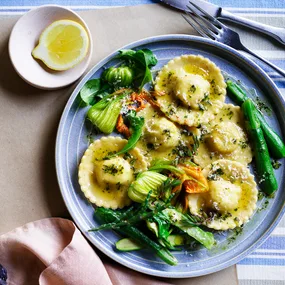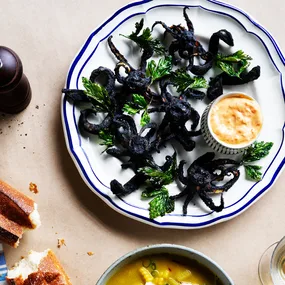Housed on the ground floor of an anonymous building in an anonymous suburb of the fishing port of Fano in Italy’s Marche region, Maria Tena’s brilliant seafood restaurant, unimaginatively named Da Maria, doesn’t look like a restaurant at all. Outside, the only clue to its identity is a nondescript sign over the door saying “Bar Trattoria – Pesce Fresco.” If it weren’t cluttered with the esoteric wood, glass and metal sculptures of Maria’s daughter, Domenica, the interior – a single room with pink-and-white-tiled walls, a few tables and a bar counter – would be no less modest. The place seems an unlikely sanctuary for a piscine pilgrimage but I, like other devotees, make a point of eating there whenever I’m passing through.
It’s Domenica who answers the phone when one calls to book. Her tone is always apologetic and she speaks as if she’s reading from a script. “We only serve fish but today’s catch was nothing special and we haven’t much to offer. Ma se vi accontentate…” Loosely translated, that means, “Come if you’re prepared to make do with what we’ve got.” She repeats the same litany every time but I know from experience that Maria, a tiny woman in a tiny kitchen – three gas rings, a few earthenware pots, a grill and a granite worktop – is sure to rustle up something special. That something is often brodetto, the fish stew of the Adriatic.
Brodetto (variously known, depending on dialect, as brodeto, boreto, broeto, brudèt, vredòtte, vrudàtte or bredette) originated among fishermen who would cook their meals at sea with part of their catch – small fish of no commercial value or damaged by the nets – and the few condiments available on board. Close relatives of the fish stews of the Tyrrhenian to the west – Provençal bouillabaisse, Ligurian buridda, Tuscan cacciucco – from which they differ for their thicker texture, multifarious takes on brodetto dot Italy’s eastern Adriatic coast, from Trieste in Friuli-Venezia Giulia to Vasto in Abruzzo.
As early as the 16th century, the proto-celebrity chef Bartolomeo Scappi declared himself a fan. “Fishermen from Chioggia and Venice make better stews than in any other coastal area,” he wrote in his Opera, one of the first Italian recipe collections. “I believe fishermen are abler with fish than cooks,” he added, “because they cook it as soon as they catch it.”
Five centuries on, Maria echoes Scappi’s words. “If fish isn’t fresh, alive even, I send it back to the harbour. I wouldn’t even give it to the cat.” Now approaching 90, Maria has been cooking fish for over half a century, ever since she came down from her village in the hills near Urbino to marry a Fano fisherman. For her, freshness isn’t just a trite cliché, it’s part of her culinary technique.
The brodetti of the northern Adriatic tend to feature single species of fish, not only from the sea but also from the area’s lagoons and rivers. In Opera, Scappi provides a recipe for rombo in pottaggio, turbot stew, that lives on today in the form of boreto a la graisana, a speciality of Grado; east of Venice, brodeto de gô is made only with gobies; the chief ingredient in the brodeto polesano of the Po delta is eel; and in Ravenna’s brodetto alla ravennate, mantis shrimps and cuttlefish prevail.
It’s in Maria’s Marche that the most colourful, variegated brodetti are to be found, and in Fano itself there’s an Accademia del Brodetto, founded by a group of restaurateurs and academics to codify the different recipes. From Gabicce in the north of the region to San Benedetto del Tronto in the south, fishing villages and ports run into one another and it’s difficult to tell where one ends and the next begins. But each has its own version of brodetto and locals swear that theirs is the real McCoy in open displays of that very Italian sense of fierce local pride, campanilismo (literally, an attachment to the bell tower of one’s place of birth). In Ancona, which once rivalled Venice as an Adriatic seafaring power, I remember seeing two old-timers almost coming to blows in an argument over their respective recipes.
As a rule of thumb, from Ancona northwards brodetto is made with 13 types of fish (any permutation of the likes of scorpion fish, monkfish, greater weever, sole, red mullet, turbot, hake, John Dory, grey mullet, skate, octopus, squid, scampi, king prawn and razor-shell), supposedly one for each of the participants at the Last Supper, tomato and a splash of vinegar, whereas southwards it contains nine types, which are rolled in flour to thicken the stew. In Porto Recanati, they eschew tomato and add saffron, which gives a lovely golden colour, but in San Benedetto del Tronto they enrich their vrudètte with green peppers and tomatoes, a reminder of the days in which vegetables were boarded on boats to add vitamins to the fishermen’s diet, and masa, a mixture of water and vinegar, with which they quenched their thirst (captains being loath to let them drink wine on the job). Another “southern” usage that begins roughly in San Benedetto and spills over into Abruzzo is the addition of peperoncino.
Ultimately, though, brodetto is a classic case of a dish that came into being as a way of making virtue of necessity. Which is why a friend of mine, the Marche food-and-wine writer Antonio Attorre, likens it to a jazz standard, a theme open to infinite variations, and also why, albeit following a guiding thread, no two brodetti are alike.
Back in Fano, Maria’s interpretation is simplicity itself. In a closely observed ritual and with perfect timing, she plops the fish she happens to have at hand in order of firmness of flesh and size – and according to season – into a light soffritto, finely chopped onion and parsley softened in extra-virgin olive oil in one of her earthenware pots. She then pours over them a sauce of strained fish stock, tomato and more onion and parsley. A splash of white wine vinegar and all that remains is to leave the stew to simmer for an hour or so over the smouldering embers of the charcoal grill. “That’s all there is to it,” says Maria. “The brodetto cooks itself.”
The resulting flavour is the sum of the parts, elemental with all the fleshy sweetness of marine life, bearing out the pronouncement of Domenica, who’s an Eastern philosophy buff and talks like Confucius. “A good brodetto shouldn’t taste of fish, it should taste of the sea.”
Words by John Irving, recipe by Lisa Featherby.










